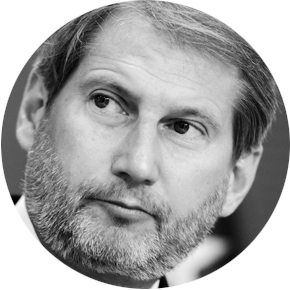On November 17 Armenian will host the eighth unofficial meeting of the Foreign Ministers of the Eastern Partnership (EaP). The meeting will be attended by Johannes Hahn, Commissioner for European Neighborhood Policy and Enlargement Negotiations, who talked to Mediamax on the eve of his visit to Armenia.
- What are the primary issues to be discussed during this meeting?
- I will attend the meeting together with Carlos Moedas, EU Commissioner for Research, Science and Innovation and Jean-Christophe Belliard, Deputy Secretary General of the European External Action Service, to discuss with our partners on the progress made across the key areas of cooperation agreed at the Riga Summit last year. We will also exchange on ways to enhance the effectiveness of the Eastern Partnership and possible deliverables to be achieved by the next Eastern Partnership Summit foreseen for November 2017 in Brussels.
Commissioner Moedas and I will also launch a new EU initiative, EU4Innovation, which combines all EU activities that support the development of Eastern Partnership countries (EaP) innovation capacities, notably those funded under the Horizon 2020 programme and the European Neighborhood Instrument.
- Most EU member states accept that EU needs to remold its support for fundamental political reform in EaP partner states. So what needs to be done so Eastern Partnership is not reduced to symbols and slogans that are not followed by concrete actions?
- The success of the Eastern Partnership depends on our active involvement. In all my meetings with member states and partner countries’ ministers I see a clear commitment to step up actions in key the priority areas:
- economic development and market opportunities;
- strengthening institutions and good governance;
-connectivity and energy efficiency;
- mobility and people to people contacts.
This commitment provides new impetus to our cooperation in view of making the Eastern Partnership deliver tangible results for citizens across all countries.
We need to be ambitious, but also credible, having clarity on what our partner countries can deliver and how we can support them politically and financially. We already do a lot, including in your country, where we have engaged and invested heavily in support to small and medium sized enterprises, justice reform, regional development and agriculture (through ENPARD).
We will also support the implementation of the electoral reform. In the next period we can provide more and more targeted support in view of achieving clearer and more visible results to your citizens.
- Some experts say that EU members have an important role to play in implementing the Eastern Partnership, although its success depends on the Eastern neighbors’ commitment to the project. Do you see that commitment?
- Since the last Eastern Partnership Summit in Riga in 2015, the ongoing discussions with EU member states and Eastern Partner countries on developments in the region have shown immense commitment by our EU member states. This was confirmed at the EaP Ministerial Meeting in Brussels on 23 May this year, where we all committed to scale up our joint efforts in view of delivering under each of the Riga priorities.
Partner countries confirmed their commitment to the EaP when I met them last at the informal Partnership Dialogue in Kiev this summer, and when we had an informal meeting in Bratislava in September.
We had a meeting with EU ministers on the Eastern Partnership this week in Brussels. We committed to focus on implementation and on delivery in line with commitments made. I expect the next EaP Summit taking place in Brussels in November 2017 to look back at the progress made and consolidate the important work we do together with our partners so that we can continue to deliver tangible results to citizens.
- How will you assess current EU-Armenia cooperation and negotiations on a new framework document between Armenia and the European Union?
- The EU and Armenia have a long-standing record of extensive cooperation. We have achieved a lot together not only in financial cooperation but also in supporting the reforms in the country and engaging in the region. We have also an important mobility partnership. We share common values and interests.
We are now entering a new phase as we are about to finalize the negotiations on a new comprehensive agreement, which will bring concrete benefits to our citizens and companies. Good progress has been achieved already in the negotiations but we should not underestimate the remaining challenges notably in the area of trade.
Armenia has also signaled its interest to negotiate a civil aviation agreement and we expect to get shortly the green light from our member states to launch this negotiation. We are also negotiating EU-Armenia Partnership Priorities which will shape our relations in the next few years. Our aim is to strengthen Armenia’s resilience and economic potential in view of providing clear and visible benefits to citizens.
- Is there a date when the documents will be signed?
- It is still early to give a date as negotiations are under way, but I am confident that with joint efforts we will soon be able to move forward for the benefit of both the EU and Armenia.
Taguhi Hovhannisyan talked to Johannes Hahn





















Comments
Dear visitors, You can place your opinion on the material using your Facebook account. Please, be polite and follow our simple rules: you are not allowed to make off - topic comments, place advertisements, use abusive and filthy language. The editorial staff reserves the right to moderate and delete comments in case of breach of the rules.